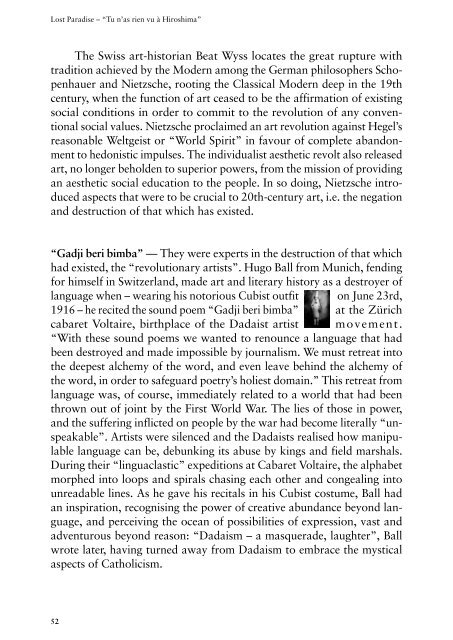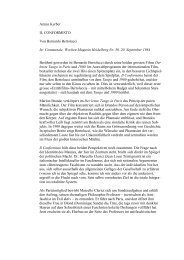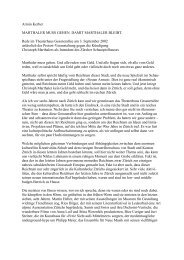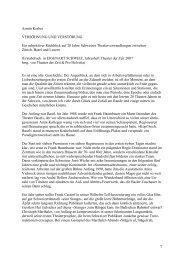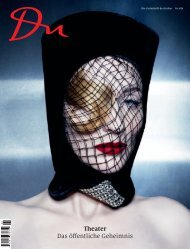Create successful ePaper yourself
Turn your PDF publications into a flip-book with our unique Google optimized e-Paper software.
<strong>Lost</strong> <strong>Paradise</strong> – “Tu n’as rien vu à Hiroshima”<br />
The Swiss art-historian Beat Wyss locates the great rupture with<br />
tradition achieved by the Modern among the German philosophers Schopenhauer<br />
and Nietzsche, rooting the Classical Modern deep in the 19th<br />
century, when the function of art ceased to be the affirmation of existing<br />
social conditions in order to commit to the revolution of any conventional<br />
social values. Nietzsche proclaimed an art revolution against Hegel’s<br />
reasonable Weltgeist or “World Spirit” in favour of complete abandonment<br />
to hedonistic impulses. The individualist aesthetic revolt also released<br />
art, no longer beholden to superior powers, from the mission of providing<br />
an aesthetic social education to the people. In so doing, Nietzsche introduced<br />
aspects that were to be crucial to 20th-century art, i.e. the negation<br />
and destruction of that which has existed.<br />
“Gadji beri bimba” — They were experts in the destruction of that which<br />
had existed, the “revolutionary artists”. Hugo Ball from Munich, fending<br />
for himself in Switzerland, made art and literary history as a destroyer of<br />
language when – wearing his notorious Cubist outfit on June 23rd,<br />
1916 – he recited the sound poem “Gadji beri bimba” at the Zürich<br />
cabaret Voltaire, birthplace of the Dadaist artist movement.<br />
“With these sound poems we wanted to renounce a language that had<br />
been destroyed and made impossible by journalism. We must retreat into<br />
the deepest alchemy of the word, and even leave behind the alchemy of<br />
the word, in order to safeguard poetry’s holiest domain.” This retreat from<br />
language was, of course, immediately related to a world that had been<br />
thrown out of joint by the First World War. The lies of those in power,<br />
and the suffering inflicted on people by the war had become literally “unspeakable”.<br />
Artists were silenced and the Dadaists realised how manipulable<br />
language can be, debunking its abuse by kings and field marshals.<br />
During their “linguaclastic” expeditions at Cabaret Voltaire, the alphabet<br />
morphed into loops and spirals chasing each other and congealing into<br />
unreadable lines. As he gave his recitals in his Cubist costume, Ball had<br />
an inspiration, recognising the power of creative abundance beyond language,<br />
and perceiving the ocean of possibilities of expression, vast and<br />
adventurous beyond reason: “Dadaism – a masquerade, laughter”, Ball<br />
wrote later, having turned away from Dadaism to embrace the mystical<br />
aspects of Catholicism.<br />
52


